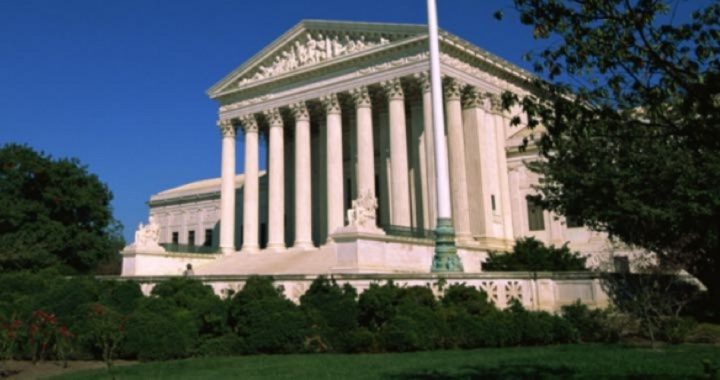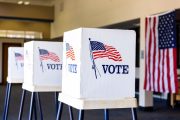
In the latest round of judicial volleyball pertaining to President Trump’s March 6 executive order, “Protecting the Nation From Foreign Terrorists’ Entry Into the United States,” the Supreme Court has asked the State of Hawaii to respond by noon on July 18 to the Trump Justice Department’s appeal of Hawaii District Court Judge Derrick Watson’s July 13 ruling on the ban. That ruling substituted Watson’s own interpretation of the Supreme Court’s June 26 ruling that allowed the travel ban to go into effect for the Trump administration’s interpretation of it.
The Supreme Court’s June 26 ruling exempted only one category of foreigners from the travel ban: those “with a credible claim of a bona fide relationship with a person or entity in the United States.” The Trump administration interpreted that exemption as applying only to immediate family members such as a parent, spouse, fiancé, son, daughter, son-in-law, daughter-in-law, or sibling. However, in his July 13 ruling, Watson decided to expand the exemption considerably, to include grandparents, grandchildren, brothers-in-law, sisters-in-law, aunts, uncles, nieces, nephews, and cousins of people already in this country.
In his ruling, Watson touted the superiority of his own definition above that of the Trump administration, asserting: “The Government’s definition represents the antithesis of common sense. Common sense, for instance, dictates that close family members be defined to include grandparents. Indeed, grandparents are the epitome of close family members. The Government’s definition excludes them. That simply cannot be.” (Emphasis in original.)
The day after Watson’s ruling, the Justice Department — headed by Attorney General Jeff Sessions — issued at statement condemning it and then appealed his decision to the Supreme Court.
The statement issued by Sessions said:
Once again, we are faced with a situation in which a single federal district court has undertaken by a nationwide injunction to micromanage decisions of the co-equal Executive Branch related to our national security. By this decision, the district court has improperly substituted its policy preferences for that of the Executive Branch, defying both the lawful prerogatives of the Executive Branch and the directive of the Supreme Court.
The district court has issued decisions that are entrusted to the Executive Branch, undermined national security, delayed necessary action, created confusion, and violated a proper respect for separation of powers. The Supreme Court has had to correct this lower court once, and we will now reluctantly return directly to the Supreme Court to again vindicate the rule of law and the Executive Branch’s duty to protect the nation.
In its appeal to the High Court, the Justice Department argued that Watson’s interpretation “empties the Court’s decision of meaning,” because it includes “not just ‘close’ family members, but virtually all family members.”
“Treating all of these relationships as ‘close familial relationship[s]’ reads the term ‘close’ out of the Court’s decision,” noted the appeal.
Watson’s July 13 ruling was his second aimed at the travel ban contained in Trump’s March 6 executive order. Last March, just hours before an amended version of the ban was scheduled to take effect, Watson granted a temporary restraining order enjoining the Trump administration executive branch from enforcing or implementing two key sections of the executive order across the nation.
The March 6 order that Watson stopped had dropped some language that had been included in the original January 27 travel ban order — language that made exceptions for persecuted religious minorities, including Christians. This well-intentioned item was misconstrued by critics (including a Seattle judge who ruled against it on February 3) as being “anti-Muslim,” so it was removed from the second order.
Despite this change, both Watson and U.S. District Judge Theodore Chuang in Maryland (who were both appointed by former president Obama) made numerous references to Trump’s alleged anti-Muslim bias in their respective decisions to block the order.
After the administration appealed these judges’ decisions to the Supreme Court, the High Court granted most of the administration’s emergency request to put the travel ban into place. Watson, however, did not give up and tried to eviscerate the Supreme Court’s decision with his own interpretation of it.
The Supreme Court has agreed to hear oral arguments in the fall over whether the travel ban violates the U.S. Constitution.
Photo of Supreme Court: Clipart.com
Related articles:
Hawaii’s Judge Watson Loosens Trump Travel Ban
Supreme Court Allows Most of Trump Travel Ban to Proceed, Will Hear Case in Fall
Ninth Circuit Court Rules Against Travel Ban, but Trump Fires Back
Trump’s DOJ Submitted “Watered Down” Version of His Travel Ban to Supreme Court
Trump Administration Asks SCOTUS to Rule on “Travel Ban”
9th Circuit Court Considers Appeal of Judge’s Order Against Trump Travel Ban
Federal Judge Upholds Trump Travel Ban Blocked by Other Courts
Federal Judges Again Block Trump Travel Ban From Nations With Terrorist Ties
Trump Signs New Immigration Executive Order
Judge Grants Stay to Bar Trump DHS From Deporting Aliens From Seven Nations of Concern
Trump’s Order Suspending Refugee Program: Racism or Balanced National Security?
Trump Executive Order to Ban Nationals of “Countries of Particular Concern”



